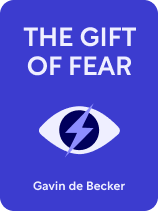

This article is an excerpt from the Shortform book guide to "The Gift of Fear" by Gavin de Becker. Shortform has the world's best summaries and analyses of books you should be reading.
Like this article? Sign up for a free trial here.
Do you trust your gut? How can you tap into your innate protective instinct?
Security specialist Gavin de Becker contends that your intuition is a powerful tool for survival. It’s constantly working to keep you safe, even when you’re not aware of it. Learning to recognize and trust your intuitive signals can help you navigate potentially dangerous situations more effectively.
Read on to discover how to harness your protective instinct and make better decisions in your daily life.
Your Protective Instinct
Imagine you’re walking along a forest trail at night. Suddenly, you get a feeling that you should turn back. This feeling is your intuition. Although you can’t consciously explain why, your subconscious has picked up on signals that have made you uneasy—like the sound of sticks cracking or shifting shadows in the trees.
De Becker argues that, to predict danger and violence, you must learn to listen to your intuition. He explains that your intuition is a powerful survival tool honed by millions of years of evolution. You’ve been biologically programmed to detect signs of danger and to avoid it—it’s the same protective instinct that allowed your ancestors to avoid threats.
However, de Becker writes that we often block our intuition from doing its job. Many of us are reluctant to follow our intuition because we rely too heavily on logic. When we experience a gut feeling—like sudden unease or fear—we rush to find reasons to discredit it. For example, you might ignore a gut feeling telling you to leave a date early because you don’t want to be rude, dismissing the feeling as just nerves.
De Becker contends that putting logic before intuition prevents you from recognizing danger. He suggests two reasons you should always trust your intuition: First, gut feelings don’t appear without a reason—they’re always triggered by something happening around you. Second, the sole purpose of your intuition is to protect you, so listening to it is rarely a bad idea. For these reasons, de Becker urges you to honor your intuition at all times: When you get a gut feeling, keep an open mind, explore its origin, and look for potential threats.
| How Your Intuition Works Like de Becker, Malcolm Gladwell in Blink explains that quick, intuitive judgments can often be more accurate than carefully reasoned decisions because of your unconscious mind’s ability to “thin slice”—to make quick, accurate judgments based on a small amount of information. To understand thin-slicing, imagine your unconscious mind as a highly efficient filter. It constantly sifts through the vast amounts of information you encounter each day, focusing on the most relevant details to form judgments. For example, when you enter a room and immediately sense tension, your brain is thin-slicing the environment, picking up on subtle cues like body language and tone of voice. While intuition can be powerful, Gladwell, like de Becker, notes that it’s challenging to honor these gut feelings. Your unconscious mind processes information faster than your conscious mind, leading to snap judgments you can’t immediately explain. When you try to rationalize intuitive decisions, you may invent inaccurate explanations that lead you further from the truth. Gladwell suggests that instead of forcing a logical reason for every gut feeling, you should accept that some knowledge comes from a deeper, less articulate part of the mind. |
Signs of Intuition
De Becker writes that your intuition speaks to you in various ways, but fear is the strongest and most important signal. Whenever you feel afraid, you should make it your immediate priority to identify and avoid any possible dangers. Even if your fear turns out to be unfounded, exploring its source can help refine your intuition for future situations.
(Shortform note: Fear originates in a part of your brain called the amygdala. This tiny structure acts like an alarm system, always on the lookout for potential threats. When it spots a threat, it sets off a chain reaction in your body—your heart races, your breathing quickens, and your muscles tense up. This “fight or flight” response prepares your body to face danger or escape from it. But your brain doesn’t just react blindly to fear. Other brain structures like your hippocampus and prefrontal cortex help interpret the context of a situation to determine if a threat is real. This is why you might feel scared on a roller coaster but also excited: Your thinking brain knows you’re safe even as your emotional brain sounds the alarm.)
De Becker urges you to heed genuine fear but cautions against inventing reasons to be afraid, as constant worry can lead to unnecessary stress and distract you from noticing real threats. True fear is an instinctive response to an actual threat, while anxiety is often voluntary and unlinked to real danger. For example, the feeling you get when you’re followed into a dark alley is fear, but constantly worrying about being mugged whenever you leave home is anxiety. Recognizing this difference allows you to focus on real threats rather than imagined ones. Listening to your intuition doesn’t mean living in constant fear but rather that you have the confidence that your instincts will alert you if there’s something that needs your attention.
| When Protective Instincts Backfire The animated film Inside Out 2 explores the distinction between anxiety and fear. It portrays Anxiety as a character who tries to protect the main character Riley from unseen threats, in contrast to Fear, who responds to visible dangers. In the movie, Anxiety initially seems to help Riley as she faces teenage challenges like preparing for high school. However, as the story progresses, Anxiety’s influence becomes overwhelming, causing Riley to adopt negative behaviors and ultimately have a panic attack. As the film shows, anxiety can be helpful for planning ahead, but too much of it can be harmful. Studies also suggest that anxiety can hinder your ability to use your intuition. It makes you less confident in your instincts, causing you to second-guess yourself. Anxiety also narrows your focus, making it harder to see the big picture and notice hidden patterns. This means that anxiety doesn’t just make you stressed—it actually interferes with your brain’s ability to process information intuitively. So, to make the best use of your intuition, ask yourself: Is there a specific, present threat, or am I worrying about something that might happen? |
De Becker points out that, besides fear, intuition can speak to you in subtler forms that you should also keep an open mind to—such as doubt, persistent thoughts, or even dark humor. People often use dark humor to voice worries without coming across as too serious about them. For example, if a colleague who’s about to walk home after a late day at the office says, “At least I’m wearing my running shoes in case a serial killer comes after me,” they’re indirectly expressing their worries about how safe their walk home is.
(Shortform note: Emotional intelligence (EI) is a necessary skill for recognizing and accurately interpreting subtler intuition cues. Research shows that people with higher EI are better at recognizing and understanding their own emotional and physical responses. This ability helps them make more informed decisions based on their gut feelings. For example, in a study that involved a gambling task, people with higher EI were able to sense when a choice was risky and avoid it, while those with lower EI misinterpreted their stress response as excitement and made poorer choices.)
How to Apply Intuition in Your Daily Life
De Becker suggests you use your intuition in daily interactions with others to assess their trustworthiness. You can do this by addressing potential issues and difficult topics directly in conversations. While these conversations can feel uncomfortable, the responses you receive can trigger your intuition and provide valuable insights. Even if they don’t respond truthfully, the signals they give through their words, body language, and overall demeanor all inform your intuitive feelings about this person.
For example, if you’re trying to find a new roommate, explicitly ask questions about things you might be worried about—such as their rent payment history or whether they had previous conflicts with roommates. Their responses can give you clues about whether they seem like they’d be a good roommate.
| Boost Your Intuition With Lie Detection Techniques The authors of Spy the Lie offer tips for detecting deception that can help you make better use of your intuition and assess someone’s trustworthiness during conversations. First, make your questions count by keeping them relevant, short, and loaded. Relevant questions help you stay focused on your goal of assessing trustworthiness. Short questions encourage quick, instinctive responses that may reveal inconsistencies. And loaded questions like “What did you do while I was gone?” imply you have some knowledge of the situation, making it harder for the person to come up with a believable answer. Then, after asking a question, the authors suggest following the five-second rule: Pay close attention to the person’s reactions within the first five seconds after you ask a question. In this brief window, people are more likely to show signs of dishonesty because they haven’t had time to think of a convincing lie. Look for clusters of verbal and nonverbal cues, such as stuttering, fidgeting, or avoiding eye contact. If you notice two or more of these signs in those first few seconds, it might indicate the person is being dishonest. |
Exercise: Reflect on Your Experiences With Intuition
De Becker emphasizes the importance of listening to your intuition as a powerful tool for predicting and avoiding danger. In this exercise, reflect on a personal experience where you felt uneasy or afraid, exploring how your intuition may have been trying to warn you.
- Think of a specific time when you felt a strong sense of unease or fear in a situation, even if nothing bad actually happened. Describe the situation briefly, including where you were and who was involved.
- What physical sensations or emotions did you experience during this moment? For example, did you feel a knot in your stomach, sweaty palms, or a sudden urge to leave?
- Can you identify any warning signs that might have set off your intuition? These could be subtle behaviors, words, or environmental cues that you noticed consciously or subconsciously.
- How did you respond to this feeling of unease? Did you listen to your intuition and take action, or did you ignore it? What was the outcome?
- If you could go back to that moment, how would you honor your intuition? What actions would you take differently?

———End of Preview———
Like what you just read? Read the rest of the world's best book summary and analysis of Gavin de Becker's "The Gift of Fear" at Shortform.
Here's what you'll find in our full The Gift of Fear summary:
- Three misconceptions about violence that make you vulnerable
- The importance of trusting your gut in dangerous situations
- How to predict and prevent different types of violence






